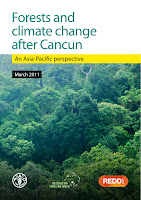The Cancun Agreement1 carries REDD+ firmly forward as a key component of the post-2012 international climate change regime by describing its main elements and operationalizing its initial phase. Before Cancun, many details of REDD+ were unclear, particularly concerning the issues of most importance to forest- dependent people.
There is now agreement that a uniform system is required for providing information on how REDD+ safeguards are being addressed and implemented. Modalities for such a system are to be determined in time for COP17 in Durban, South Africa, in December 2011 and was time COP15 in Copenhagen. Parties also agreed to allow subnational REDD+ reference levels and monitoring for an unspecified interim period.
 |
| DOWNLOAD |
funds are currently unfairly distributed.
The progress on social safeguards is particularly important. Guidance on this issue is in Annex 1 to the Agreement and will help to generate confidence in national REDD+ strategies. This is particularly important for countries such as Indonesia with highly diverse cultures, including large indigenous populations. However, although the principles of Free, Prior, and Informed Consent (FPIC) are considered by many parties and civil society observers to be an essential element of social safeguards, the Cancun Agreement text makes no specific reference to FPIC.












0 komentar:
Post a Comment